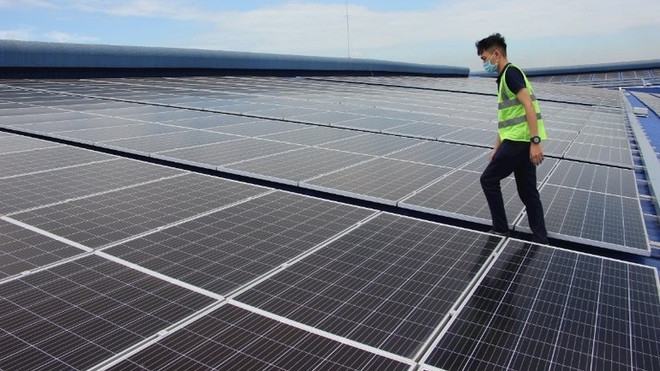Yet, despite growing interest from local authorities and businesses, the renewable energy sector is grappling with regulatory and administrative challenges that threaten to slow its green transition.
Growing local, corporate interest
Vietnam’s renewable energy ambitions are underpinned by a robust policy framework. The Politburo’s Resolution 70 aims to secure national energy security through 2030, with a vision extending to 2045, targeting a power capacity of 183-236 gigawatts by 2030, potentially higher based on demand.
Supporting this, the Government’s Decree 57 establishes direct power purchase agreements (DPPA) between renewable energy producers and major consumers, while the Decree 58 detailing certain articles of the Electricity Law to spur renewable and new energy development. Together, these are poised to unlock growth in both renewable energy and direct electricity trading markets.
    |
 |
|
A Ho Chi Minh City company installs solar rooftop panels (Photo: nhandan.vn) |
In Ho Chi Minh City, renewable energy is projected to grow at least 20% annually, according to Tran Minh Hoa, deputy head of the Energy Management Division at the municipal Department of Industry and Trade. The city is prioritizing waste-to-energy, biomass, solar, and both onshore and offshore wind projects to phase out fossil fuels. With 1,400-1,700 hours of sunlight annually and coastal wind speeds of 8-10m per second, the city is a natural fit for solar and wind development. Demand for rooftop solar is particularly strong among numerous industrial enterprises.
In the southern province of Dong Nai, a hub for thousands of domestic and foreign companies, clean energy demand is surging. The province, a major electricity consumer, is projected to use over 21 billion kWh in 2025.
Untangling regulatory hurdles
Despite the push, investors and businesses face considerable hurdles. Vo Tan Thanh, Vice Chairman of the Vietnam Chamber of Commerce and Industry (VCCI), highlighted lengthy and complex administrative processes that complicate renewable energy project rollouts. The legal framework for direct power trading remains incomplete, creating uncertainty for companies looking to buy directly from renewable sources.
Integrating multiple energy sources, particularly rooftop solar with the national grid, remains a practical challenge. While recent policies signal progress, sluggish enforcement has limited their impact, slowing Vietnam’s shift to green manufacturing and eroding the global competitiveness of some domestic firms.
Tran Huynh Ngoc, Deputy Director of the Training and Research Centre at Power Engineering Consulting JSC 2, spotlighted the potential of the DPPA mechanism to accelerate renewable energy development, foster a competitive retail electricity market, and help businesses meet green growth targets while cutting costs.
However, he stressed that authorities must finalize the legal framework, issue clear guidelines, and address bottlenecks to drive adoption, particularly in industrial zones.
Businesses, industrial parks, and even households are increasingly drawn to renewable energy. Corporate representatives are calling for a competitive retail power market that allows consumers to choose their electricity suppliers. Rooftop solar systems are gaining traction among companies seeking to reduce production costs and meet environmental, social, and governance (ESG) standards and among households looking for the most practical and cost-effective energy solutions.
Source: VNA